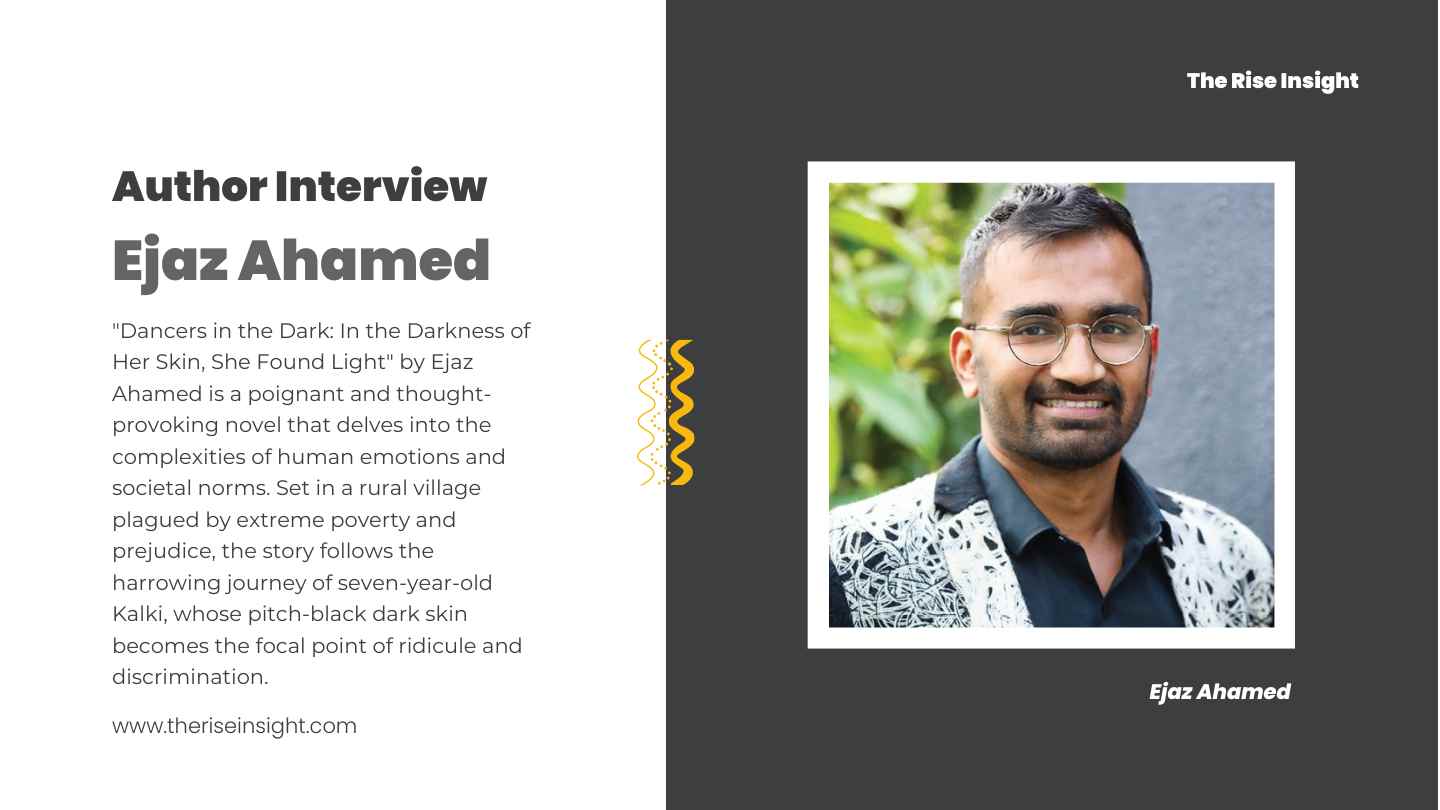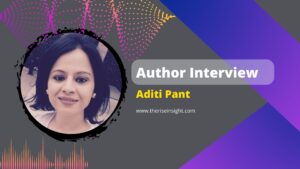The Rise Insight: First of all, congratulations on the tremendous success of your book, “Dancers in the Dark.” It has garnered quite a following since its release. How do you feel about its overwhelming reception?
Ejaz Ahamed: Thank you so much. I honestly am so grateful that people are connecting with the characters I have written about and the emotional journey they take the reader on by sharing their deepest highs and lows. Its nerve wracking not knowing how people will respond to your work so having had such positive feedback early on is such a blessing and deeply appreciated
The Rise Insight: Could you share the inspiration behind the creation of “Dancers in the Dark”? What were the significant events or experiences that led you to write this book?
Ejaz Ahamed: Being a person of colour, I have often felt a lot of the setbacks and discrimination on my own skin that the main characters have to battle in the book. So, although the characters are fictional their stories and emotional journey are completely authentic. I wanted to convey the extreme pressure one can feel growing up in a society that places so much importance on being fair – whether it is deliberate or not. A society where it is so ingrained that the fairer your skin the better job, marriage and life prospects one can attain.
The Rise Insight: As an author, do you believe “Dancers in the Dark” effectively captures your intended message, or do you anticipate exploring further themes in your future works?
Ejaz Ahamed: The strongest message I wanted to send is we are all worthy exactly the way we are, no matter the colour of our skin. We are all good enough to be anyone we wish to become and gain the respect of others, but first we must accept and love ourselves just as we are. I spent many years writing and re writing many chapters until I was convinced that the key feelings I wanted to capture can be felt by readers when they picked my book up.
The Rise Insight: The abstract nature of “Dancers in the Dark” quickly captivates readers. Did you consider other formats or styles before deciding to write it as prose?
Ejaz Ahamed: I definitely did but my 2 main goals for the writing style was I wanted the language to be as descriptive and emotive as possible so that readers felt like they were part of the story and were right there in the book with the characters in the situations they faced.
The other goal I had was to ensure that even side characters had fleshed out backstories. The last thing I wanted was just describing a chain of events linked to characters without explaining their motivations for their actions and thoughts. Even if there was a character in the book the reader disliked I wanted to explain why they behaved the way they did.
The Rise Insight: Though difficult to categorize, if you had to assign a genre to “Dancers in the Dark,” how would you describe it?
Ejaz Ahamed: I would assign the genre of literary fiction to my book.
The Rise Insight: As the author of “Dancers in the Dark,” have you been influenced by any other writers? Are there specific authors who have inspired your work?
Ejaz Ahamed: Arundhati Roy author of God of Small Things and Khaled Hosseini – A Thousand Splendid Suns, have been a huge source of inspiration for me in both the writing style and the emotive way the describe events, emotions and characters. Their works are magnificent and left me thinking about their words long after I finished reading their books. I wanted to write an emotive piece to challenge people to reflect on their own place in society and the way they interact with others. Everyone is on their own journey and we can’t judge others harshly as we don’t know what inner battles, they may be fighting despite appearing fine on the surface.
The Rise Insight: “Dancers in the Dark” has established you as a promising writer. Can we expect more literary offerings from you in the future? Could you share any insights into your upcoming projects?
Ejaz Ahamed: I am currently working on a few plotlines I have very strong ideas for them. I am usually inspired the most when something triggers an emotion that I feel I absolutely have to express and convey through characters that people will be able to relate to. But for now, I am just relishing listening to people’s feedback about the current novel and super grateful for the overwhelming support I have received from those who have already read Dancers in the dark.
The Rise Insight: Balancing subjectivity and objectivity can be challenging when selecting situations and crafting them in “Dancers in the Dark.” How did you approach maintaining an objective perspective throughout the book?
Ejaz Ahamed: I tried to also keep in mind that even though my background is Indian and I understand Indian culture regarding colourism, caste and class systems, people from other parts of the world may find it completely foreign. So, I tried to be as descriptive as possible and put myself in the shoes of someone reading my book who has spent no time in India at all.
The Rise Insight: The title “Dancers in the Dark” carries multifaceted associations. What is the story behind its selection for your book?
Ejaz Ahamed: I yearned for a title that immediately instilled a sense of futility, sadness and intrigue that also alluded to the skin colour of the main protagonist. It took me a while to arrive at the final title which refers to a scene in the book where the main characters can for the first time experience the freedom to be themselves without persecution from society in the darkness of a room hidden away in the middle of a forest. The futility of something beautiful and joyous occurring in a place where no-one would ever see.
The Rise Insight: “Dancers in the Dark” encourages readers to adopt an objective approach towards understanding life. How did you personally develop this perspective, and how does it manifest in your writing?
Ejaz Ahamed: I developed an objective perspective towards life by paying attention to the emotional response of others to the world as they experience them. I am always fascinated by how people interact with the others and deal with the difficulties and momentous occasions life has to offer. By observing the interactions others have with their surroundings I was able to write about the intricacies of the emotional bonds that develop between the characters in the book. I enjoy taking a step back and looking at the interpersonal connections that exist between people.
The Rise Insight: Prior to the creation of “Dancers in the Dark,” how would you describe your literary journey and the experiences that shaped you as a writer?
Ejaz Ahamed: I always felt the need to express my thoughts and feelings on paper from my teenage years onwards. I used to write many poems about the array of emotions I felt growing up and then released a book in my 20s which was a collection of poems ranging from joy to heartache. My biggest inspiration is my mother who always stood by me through some of the toughest times in my life.
The Rise Insight: Your book, “Dancers in the Dark,” presents unique perspectives in a simplified manner. What was the most challenging aspect of conveying such complexity in a more accessible way?
Ejaz Ahamed: It definitely wasn’t easy. I really wanted to express what I felt in such a way that even people who have never been to India would understand. That’s why I deliberately chose children as my main protagonists to show how susceptible even the minds of such innocent kids who are pure of heart are. I showed prejudice, colourism and humanitarian injustices carried out as seen through their eyes. I put myself in the place of young children and how they would perceive these concepts.
The Rise Insight: Thank you for your time, and we wish you the best of luck with your future endeavors. We look forward to reading more impactful and thrilling books from your pen.
Ejaz Ahamed: Thank you once again so much for your time it was a pleasure answering your questions.




